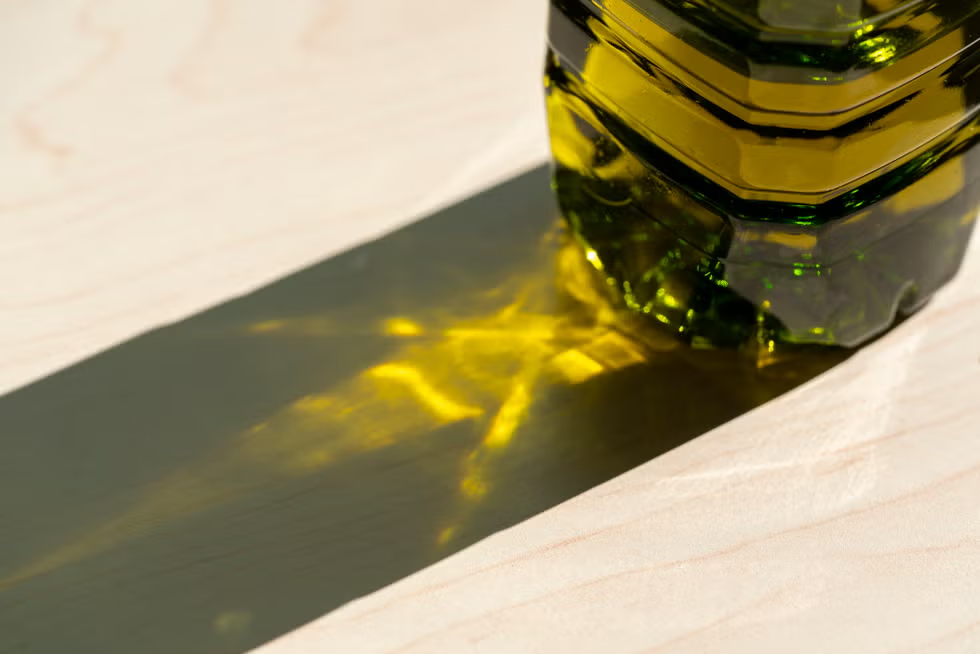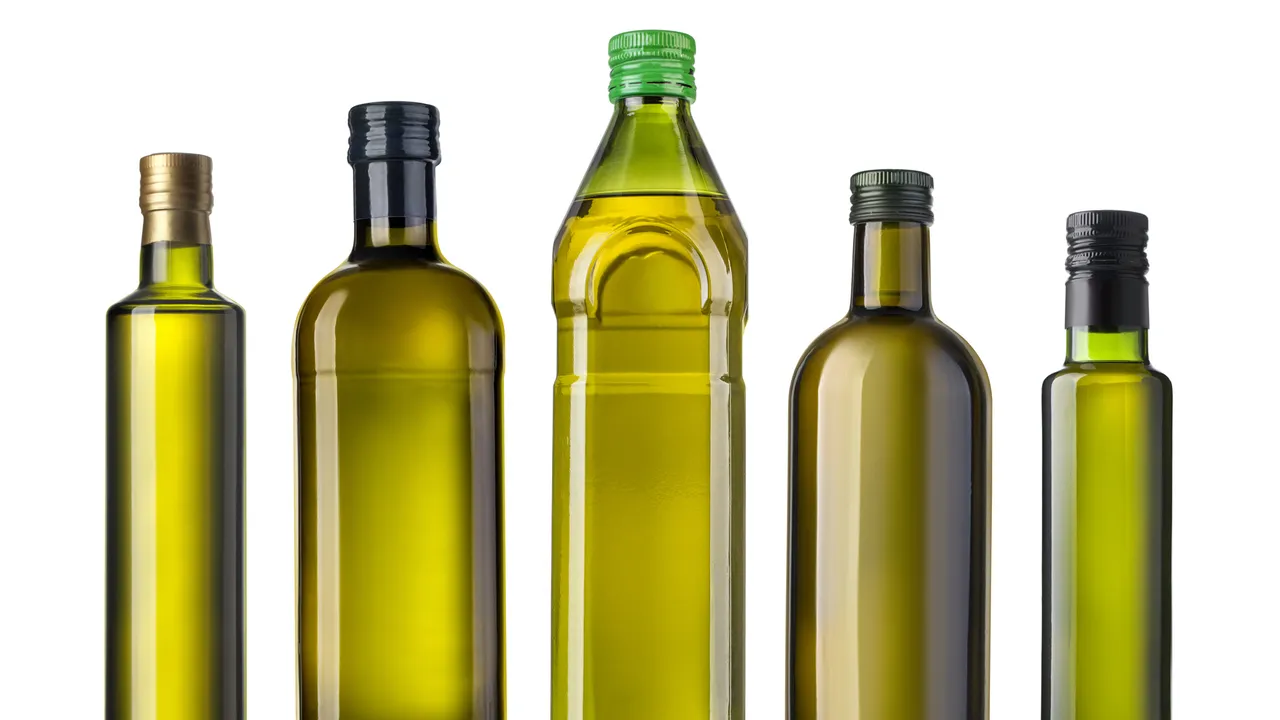Have you ever noticed that high-quality olive oil almost always comes swathed in dark green or brown glass bottle? It’s not just a stylish design choice – it’s a crucial shield protecting the precious liquid gold inside. While you might admire the elegant, opaque bottle, the secret lies in science: light is one of olive oil’s fiercest enemies. Exposure to light, especially sunlight and fluorescent light, triggers rapid oxidation and degradation, robbing the oil of its vibrant flavor, health-boosting antioxidants (like polyphenols), and overall freshness. That dark glass bottle acts as a powerful barrier, significantly slowing this damaging process and ensuring the oil reaches your kitchen in peak condition. Let’s delve into why protecting olive oil from light is so essential and how the humble dark glass bottle becomes popular.

Table of Contents
To Block Harmful Light and Prevent Photo-oxidation
Olive oil is surprisingly sensitive to light. When exposed to UV rays or even bright visible light, it undergoes a process called photo-oxidation—essentially, light speeds up the breakdown of the oil. This is why you’ll almost always find high-quality olive oil in dark glass bottles, like deep green, amber, or brown. These bottles aren’t just stylish; they act like sunglasses for your oil. By blocking up to 99% of damaging UV light, dark glass shields the oil from forming harmful free radicals. It also keeps precious antioxidants—like polyphenols and chlorophyll—from breaking down too soon.
How Light Damages Olive Oil
Ever wonder what happens when olive oil sits under bright lights? The damage adds up fast. Light exposure causes antioxidants (think phenolic compounds and vitamin E) to vanish quickly, robbing the oil of its health perks. Flavor and aroma fade, leaving the oil tasting flat or even rancid. Worst of all, the shelf life shrinks dramatically. For example, olive oil in clear bottles can show serious oxidation in just 150 days under normal store lighting—meaning you lose both freshness and nutritional value far sooner than you’d expect.
Protective Performance: Dark Glass vs. Other Packaging
It’s no accident that premium olive oil brands swear by dark glass bottles. These containers help preserve quality for 18–24 months after harvest. Their narrow necks and tight seals also minimize air exposure, doubling down on protection. While clear glass might look pretty, it offers little defense against light damage. Opaque options—like dark-tinted glass or stainless steel—do a far better job locking in nutrients and flavor. Dark glass stands out as a top choice because it’s non-reactive (so no chemical interference) and physically blocks light like a shield. That’s why it’s the gold standard for extra virgin olive oil.
Data and Research Highlights
The science backs up what olive oil lovers have known for years. Studies confirm dark glass blocks up to 99% of UV rays, while oils in clear bottles show measurable quality loss within 5 months. Even inside dark green bottles, phenolic content slowly drops under supermarket lights—proving no packaging is perfect. For the longest shelf life (up to 24 months), store olive oil around 15–21°C (60–70°F) in dark glass. Newer options like foil-wrapped bottles or multilayer containers may offer even stronger light barriers, especially in high-exposure environments.
The Takeaway
Choosing dark glass isn’t just tradition—it’s a vital step to slow photo-oxidation. By blocking light, these bottles safeguard the oil’s complex flavors, antioxidants, and nutritional punch. While newer packaging innovations are emerging, dark glass remains the simplest, most effective way to keep olive oil tasting like liquid gold.

To Preserve Antioxidants and Nutritional Value in Olive Oil
Dark glass bottles play a crucial role in protecting olive oil’s delicate antioxidants and nutrients. By shielding the oil from light—especially UV rays—these bottles prevent rapid degradation of healthy compounds. Research shows olive oil in clear glass can lose up to 30% of its polyphenols in just weeks when exposed to light. In contrast, oil stored in dark glass or opaque containers retains these valuable antioxidants far more effectively.
Why Antioxidant Protection Matters
Light triggers photo-oxidation, a process that breaks down olive oil’s signature health-boosting compounds: polyphenols, vitamin E, carotenes, and chlorophyll. These aren’t just responsible for the oil’s peppery kick and grassy aroma—they’re the very elements that make olive oil a nutritional powerhouse. When light degrades them, the oil loses both flavor complexity and health benefits while spoiling faster.
Performance of Different Bottles: Amber, Green, and More
Not all dark glass is created equal. Amber glass leads the pack, blocking over 95% of UV radiation for maximum protection. Green glass, while slightly less efficient, still offers robust light-blocking properties and remains a popular choice for its classic look. Studies tracking olive oil over six months confirm this: oils in amber/green glass or tin containers retained significantly more carotenes, chlorophylls, and phenols while showing minimal oxidation. Clear glass and plastic, however, allowed rapid nutrient loss and flavor decay.
Research Highlights & Practical Impact
The numbers speak volumes:
Olive oil in clear bottles shows measurable oxidation and antioxidant loss within 150 days under typical conditions.
Up to 30% of polyphenols vanish in weeks when light exposure is high.
Dark glass (especially amber) and tin containers consistently preserve freshness and extend shelf life.
For maximum nutritional value and flavor, choosing olive oil in amber or green dark glass bottles is a simple yet powerful step. While newer packaging like light-proof tins offers alternatives, dark glass remains the gold standard for balancing protection, tradition, and sustainability.

To Keep Olive Oil’s Flavor and Aroma Fresh
Dark glass bottles are essential for preserving olive oil’s vibrant flavor and complex aroma. By blocking harmful light—especially UV rays—these bottles prevent photo-oxidation, the chemical reaction that degrades both taste and nutrients. Without this protection, olive oil in clear glass can lose up to 30% of its polyphenols in mere weeks. These compounds aren’t just health boosters; they create the oil’s signature peppery notes and grassy scent.
What Light Does to Freshness
When light hits olive oil, it accelerates spoilage in two ways: it dulls bright, fruity flavors and generates stale, rancid odors. This isn’t just about taste—it shortens shelf life dramatically. Studies confirm oils stored in dark glass retain their nuanced flavor profiles far longer than those in clear or plastic containers. The difference is unmistakable: protected oils maintain their fresh, complex character, while exposed oils turn flat and bitter.
Packaging Insights and Practical Tips
Top olive oil producers universally choose dark glass bottles (green, amber, or brown)—and for good reason. These containers shield the oil during transport and storage, ensuring quality reaches your kitchen. Clear bottles offer virtually no defense, while ceramic or stainless steel provide even stronger light blocking—though dark glass remains the most practical balance of protection, cost, and accessibility.
Simple Habits for Maximum Freshness
Beyond choosing dark glass, two habits make a big difference:
Store bottles in a cool, dark cupboard—never near windows or stoves.
Always reseal the cap tightly after use to minimize air exposure.
These steps can extend peak freshness by months, preserving both flavor and health benefits.
The Bottom Line
Dark glass isn’t just packaging tradition—it’s a flavor shield. By stopping photo-oxidation, these bottles lock in olive oil’s vibrant taste, enticing aroma, and nutritional value. Whether you drizzle it over salads or dip crusty bread, that first pour should always taste as fresh as the day it was bottled.
To Extend Shelf Life: Why Dark Glass Bottles Win
Choosing the right packaging makes all the difference in maximizing olive oil’s shelf life. Dark glass bottles stand out as the top choice, significantly slowing spoilage and keeping oil fresher longer compared to alternatives.
Shelf Life Showdown: Dark Glass vs. Plastic vs. Clear Glass
The numbers tell a clear story:
Dark glass bottles preserve quality for 12–18 months, maintaining vibrant flavor and nutrients like vitamin E with minimal oxidation.
Plastic containers fall short, offering just 6–12 months of freshness while allowing faster nutrient loss and flavor degradation.
Clear glass is the weakest link—oils often turn rancid in under 6 months, sometimes in just 150 days under store lighting. With poor light protection and high oxidation risk, these bottles sacrifice both taste and nutrition.
Why Packaging Dictates Freshness
Opaque containers—especially dark glass, stainless steel, or ceramic—act as shields against UV and visible light. This barrier safeguards antioxidants, preserves vitamin E, and locks in complex flavors far longer than transparent materials. Industry experts emphasize: the container is as critical as the oil quality itself for maintaining shelf life.
Real-World Proof & Premium Practices
Field studies confirm oils stored in dark glass or tin at ~20°C (68°F) retain peak flavor and aroma for at least 180 days with negligible quality drop. It’s no surprise premium brands overwhelmingly choose dark amber, green, or brown bottles—this ensures the oil reaching your kitchen tastes as fresh as bottling day.
Maximizing Shelf Life: Simple Storage Wins
Three habits make a dramatic difference:
Store in a cool, dark spot (ideally 14–21°C / 57–70°F) away from stoves or sunlight.
Always reseal tightly to minimize air exposure.
Prioritize dark-tinted glass (amber/green/brown) for optimal light blocking.
The Takeaway
For noticeably longer shelf life and preserved quality, dark glass bottles are the undisputed champion. Paired with smart storage, this simple choice transforms your olive oil from a short-lived pantry item into a long-lasting flavor powerhouse.
Why Dark Glass Wins for Stability & Purity
The packaging you choose directly impacts olive oil’s freshness, flavor, and nutritional integrity. Dark glass bottles (especially amber or green) excel at preserving all three by tackling oil’s greatest enemies: light and contamination.
The Science Behind the Shield
Ultraviolet (UV) rays are oxidative wrecking balls—they degrade antioxidants and speed up spoilage. Dark glass blocks up to 99% of this damaging light, dramatically slowing nutrient loss. Equally important, glass is chemically inert. Unlike some plastics, it won’t leach harmful compounds into the oil or alter its delicate chemistry. This dual defense—light blocking + non-reactivity—keeps olive oil stable and pure far longer than plastic or clear glass.
Why Premium Brands Trust Dark Glass
Leading producers like Big Horn Olive Oil exclusively use dark glass—and for good reason. It’s the gold standard for transporting oil without compromising quality. As industry experts stress: “The bottle is as critical as the oil inside.”
The Bottom Line
Dark glass bottles aren’t just packaging—they’re purity guardians. By blocking UV light and preventing chemical contamination, they extend shelf life by up to 50% vs. plastic while preserving every drop of flavor and nutrition. For olive oil that tastes as vibrant on day 300 as day one, dark glass is the undisputed champion.

In Conclusion: More Than Just Tradition
Dark glass bottles aren’t merely an aesthetic choice for olive oil—they’re a scientifically grounded shield against light, heat, and oxidation. By blocking up to 99% of UV rays, these bottles preserve the oil’s vibrant flavors, precious antioxidants, and nutritional integrity for 18-24 months. While alternatives like plastic or clear glass accelerate spoilage, dark glass remains the gold standard for protecting “liquid gold” from grove to kitchen.
At TP Glass Bottle Manufacturer, we engineer this science into every bottle. Our amber and green glass vessels combine centuries-old craftsmanship with modern precision—non-reactive, UV-blocking, and tailored to safeguard delicate oils. Trusted by premium brands worldwide, we transform light sensitivity into lasting freshness. Because when quality matters, the bottle is as vital as what fills it.

